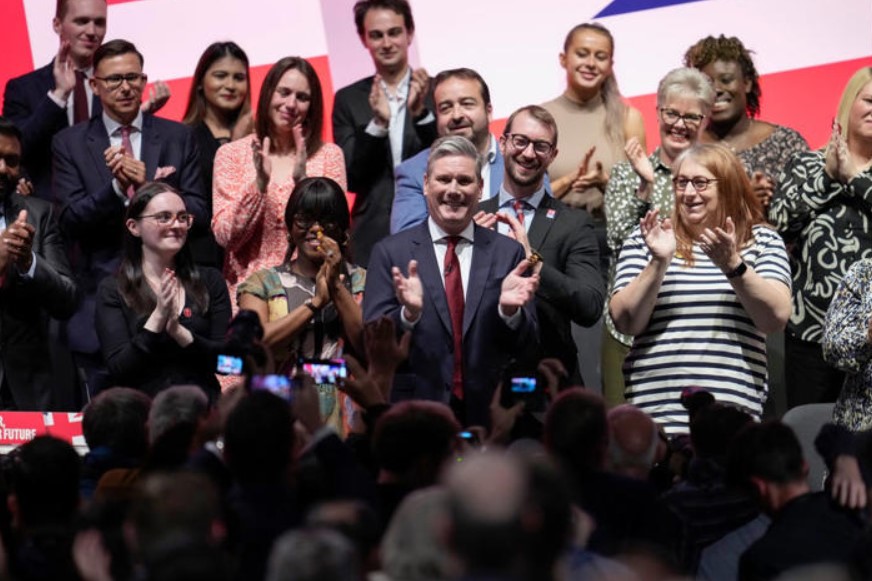Keir Starmer’s speech was a penalty shootout against a team that’s already gone home

There is always a moment when an opposition party starts to look like a government in waiting. At the end of the 2009 Conservative Party conference, David Cameron lined up his shadow cabinet behind him – George Osborne, William Hague, Liam Fox, Theresa May, Andrew Mitchell, the list goes on – and it seemed inevitable to the point of certainty that the voters were going to give these people their blessing.
Thirteen years later, on to the stage in Liverpool, out strode Keir Starmer. It is by no means inevitable that he will be the next prime minister, but you really do have to feel that momentum is on his side. Why do you have to feel that? Well, there were some clues in the speech itself.
“There is raw sewage in our rivers and seas,” he said. “Crimes like burglary totally unpunished. People are told to drive themselves to hospital after having a heart attack.”
Look, we all know that political soothsaying is a mug’s game but when the sea’s full of s*** and no one does anything about when you get burgled and there are people having heart attacks in their own cars, you just get that same sort of sense of inevitability really, don’t you?
That everything is just completely and utterly banjaxed. And this wasn’t even Keir Starmer’s introduction. This was several minutes in. Who knows, before last Friday, maybe this would have been higher up. But he also had to mention the destroyed currency, the higher interest rates as a direct result, and the inevitable mortgage misery it will cause. And what is it for?
Well, it’s in service of just one policy, so far, and that’s to fund a tax cut solely for the benefit of high earners, the sort of thing that the Tories worked out they had to stop doing some time in around 2006, or at least attempt to conceal, or they’d never be in government again.
Politicians are always warned not to be seen to be “measuring the curtains” in Downing Street, but what is Keir Starmer meant to do if the current occupant appears to be going out of her way to open up the door and drop kick the Labour Party through it?
The backdrop to Starmer’s speech was a YouGov poll showing the largest poll lead that polling company has ever produced since it started up in 2001. That’s right: 17 points. Various hard-right Tories who backed Liz Truss are determined not to accept the colossal error they have made, and have been dredging up worse polls for Margaret Thatcher in the early Eighties. Of course, Truss could turn it around – but for the historical parallel to be exact, she would need whoever is the equivalent of Roy Jenkins to set up a rival party and for Argentina to invade the Falklands. These things may not happen.
Starmer is regularly accused of being boring. Such accusations occur because he is indeed boring. But the voters truly do not seem to care. They are bored of not being bored. For a while, Truss being boring seemed like a welcome antidote. Her plodding statements and speeches did not in any way meet the historic moment of the death of the Queen, but had Johnson been around, he would somehow have made it all about him, in his own, uniquely repellent way (as he did in the House of Commons).
But Truss really isn’t boring anymore. Setting fire to the economy, hammering house prices and jacking up mortgages for the ordinary people who have already been asked to pay for tax cuts for millionaires couldn’t be less boring.
She’s also had walking electoral kryptonite Jacob Rees-Mogg lift the ban on fracking and then go on TV to announce that it’s been made possible through worrying less about earthquakes. People, generally speaking, are not pro-earthquake. They’re not pro-fossil fuel either, because they can see that it’s burning up their children’s futures. And they were allowed to become so frightened about energy prices for so long (because the Tories had to have a leadership contest all summer rather than do anything about it) that they are now sufficiently literate in the workings of the energy market to understand that a few extra droplets of gas in about a decade’s time won’t make any difference at all.
Starmer, meanwhile, is going to launch a new state-owned energy company, Great British Energy, which he reckons is going to invest in clean power and become as big as the French state-owned energy company, EDF. Truss, meanwhile, spent most of the summer telling rooms full of Tories that solar power was bad. That she didn’t want to see “solar panels in fields”; somehow unaware that cheap, non-planet destroying power is immensely popular.
The speech was billed, in advance, as an open goal, but it was more than that. It was several open goals. It was a penalty shootout against a team that’s already gone home. And Starmer gently slotted his home, one after the other, after the other.
He could hardly fail to do so, in his own steady way. At some point, in the short years ahead, the Tories will surely have to start making it harder for him. They could hardly be making it any easier. But then, the worst of the pain is yet to come. If this was the most important speech of Starmer’s career, it was also the easiest. He did just fine. And it’s not that that’s all that can be expected, but it’s certainly all that’s needed.







